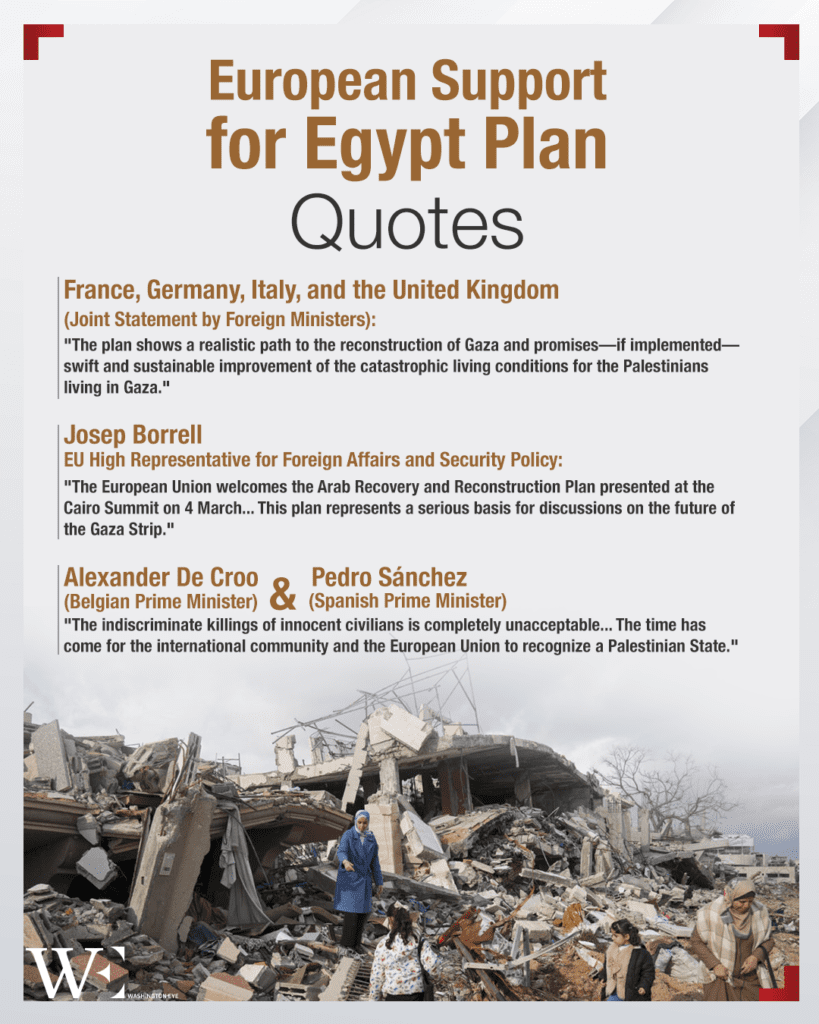As Gaza faces mounting humanitarian and political challenges, European leaders have rallied behind an Arab-led initiative aimed at rebuilding the devastated region. France, Germany, Italy, and the United Kingdom have expressed their support for the plan, which combines urgent humanitarian assistance with a long-term governance strategy. With infrastructure in ruins and millions in need of aid, this initiative is being positioned as a pragmatic solution to one of the Middle East’s most pressing crises.
The Arab Initiative: A Blueprint for Reconstruction
The plan, formulated under Egypt’s leadership and endorsed by Arab nations, outlines a $53 billion investment over five years to rebuild Gaza’s infrastructure and economy. Central to this proposal is the establishment of an administrative committee composed of independent Palestinian technocrats. This body would oversee the distribution of humanitarian aid and manage Gaza’s affairs temporarily, operating under the supervision of the Palestinian Authority. The initiative aims to improve living conditions without necessitating the displacement of Palestinians from the enclave.
European Support: A Unified Stance
In a joint statement, the foreign ministers of France, Germany, Italy, and the UK lauded the Arab plan as a “realistic path to the reconstruction of Gaza.” They emphasized that, if implemented, it promises a swift and sustainable enhancement of the dire living conditions faced by Palestinians in Gaza. The ministers also underscored their commitment to collaborating with Arab nations on this initiative, highlighting the significant signal sent by the Arab states in developing the plan. Furthermore, European leaders stressed that any long-term solution should include not just rebuilding efforts, but also the reintegration of Gaza into a broader framework for Palestinian self-governance, ensuring that economic and political reforms go hand in hand.
Governance and Security Considerations
A pivotal aspect of the European ministers’ endorsement is the stipulation that Hamas should neither govern Gaza nor pose a threat to Israel. They advocate for a central role for the Palestinian Authority in Gaza’s administration and support the implementation of its reform agenda. This position aligns with the broader international consensus that seeks to ensure Gaza’s reconstruction is accompanied by stable and representative governance structures. European officials also highlighted the need for increased international oversight to ensure transparency and prevent the misuse of funds. They have suggested the formation of a monitoring body composed of UN representatives, Arab League officials, and EU envoys to oversee the reconstruction process and prevent corruption or inefficiencies.
Contrasting Perspectives: U.S. and Israeli Responses
The Arab-backed plan has encountered resistance from both Israel and the United States. President Donald Trump has proposed an alternative vision, aiming to transform Gaza into a “Middle East Riviera,” which has been met with criticism from various quarters. Conversely, the Egyptian-led proposal emphasizes reconstruction without displacing the Palestinian population, focusing on creating secure areas within Gaza for displaced residents and involving Egyptian and international firms in rebuilding efforts.
A Final Note: Away From a Unified Transatlantic Approach?
The European endorsement of the Arab-backed plan signals a shift in Western diplomatic alignments, with the EU diverging from the traditionally unified transatlantic approach. While the United States has championed an alternative vision for Gaza’s future—one closely aligned with Israeli interests—European nations have opted to support a framework rooted in regional cooperation. This decision reflects growing European autonomy in Middle Eastern diplomacy, distancing itself from Washington’s positions.
This shift comes amid broader transatlantic tensions, with Europe increasingly at odds with the U.S. over other geopolitical crises, including Trump’s controversial stance on the war in Ukraine and his evolving relationship with Russia. The EU’s decision to back an Arab-led solution for Gaza, rather than align with the U.S.-Israel bloc, may be an indication of a widening rift between European capitals and Washington. As the crisis in Gaza unfolds, this development could have lasting implications for the balance of power in international diplomacy.















